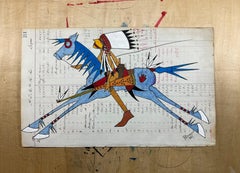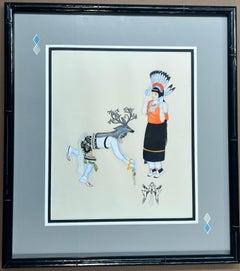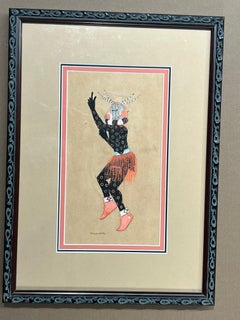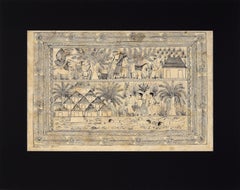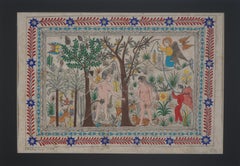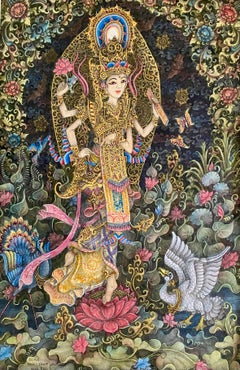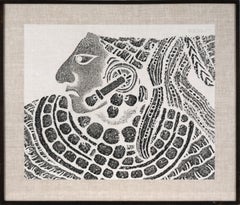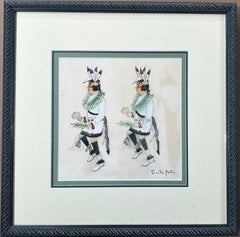Tribal Figurative Drawings and Watercolors
to
4
6
1
2
Overall Width
to
Overall Height
to
6
3
2
1
1
5,075
3,296
585
375
264
251
233
211
168
151
57
48
48
43
6
3
8
5
4
3
2
2
2
2
1
1
1
1
1
7
6
5
3
3
4
2
7
Style: Tribal
Indian Warrior on Pale Blue Horse (Plains Indians Ledger Art) Blackfeet Nation
Located in Cody, WY
UNIQUE piece. TITLE: OUT FOR MORE. John Isaiah Pepion is a noted contemporary indigenous artist and renowned graphic ledger artist, muralist, and educator based on the Blackfeet Nati...
Category
2010s Tribal Figurative Drawings and Watercolors
Materials
Paper, Ink, Acrylic, Color Pencil
Deer Dance, painting by Tonita Pena, Santa Fe, Cochiti, Pueblo, male, female
Located in Santa Fe, NM
Deer Dance, painting by Tonita Pena, Santa Fe, Cochiti, Pueblo, male, female
Tonita Peña (born 1893 in San Ildefonso, died 1949 in Kewa Pueblo, New Mexico) was born as Quah Ah (meaning white coral beads) but also used the name Tonita Vigil Peña and María Antonia Tonita Peña. Peña was a renowned Pueblo artist, specializing in pen and ink on paper embellished with watercolor. She was a well-known and influential Native American artist and art teacher of the early 1920s and 1930s.
Tonita Peña was born on May 10, 1893, at San Ildefonso Pueblo, to Ascensión Vigil Peña and Natividad Peña of San Ildefonso Pueblo, New Mexico. When she was 12, her mother and younger sister died, as a result of complications due to the flu. Her father was unable to care for her and she was taken to Cochití Pueblo and was brought up by her aunt Martina Vigil Montoya, a prominent Cochití Pueblo potter. Peña attended St. Catherine Indian School in Santa Fe.
Edgar Lee Hewett, an anthropologist involved in supervising the nearby Frijoles Canyon excavations (now Bandelier National Monument) was instrumental in developing the careers of several San Ildefonso “self-taught” artists including Tonita Peña. Hewett purchased Peña's paintings for the Museum of New Mexico and supplied her with quality paint and paper. Peña began gaining more notoriety by the end of the 1910s selling an increasing amount of her work to collectors and the La Fonda Hotel. Much of this early work was done of Pueblo cultural subject matter, in a style inspired by historic Native American works, however, her use of an artist's easel and Western painting mediums gained her acceptance among her European-American contemporaries in the art world. At the age of 25, she exhibited her work at museums and galleries in the Santa Fe and Albuquerque area.
In the early 1920s, Tonita did not know how much her painting sold for at the Museum of New Mexico, so she wrote letters to the administrators because a local farmer was worried that she got paid too little.
In the 1930s Peña was an instructor at the Santa Fe Indian School and at the Albuquerque Indian School and the only woman painter of the San Ildefonso Self-Taught Group, which included such noted artists as Alfonso Roybal, Julian Martinez, Abel Sánchez (Oqwa Pi), Crecencio Martinez, and Encarnación Peña. As children, these artists attended San Ildefonso day school which was part of the institution of the Dawes Act of 1887, designed to indoctrinate and assimilate Native American children into mainstream American society.
In 1931, Tonita Peña exhibited at the Exposition of Indian Tribal Arts which was presented at the Grand Central Art Galleries in New York City. Works from this exhibition were shown at the 1932 Venice Biennial. That year is the only time Native American artists have shown in the official United States pavilion at that biennial, and Tonita Peña's paintings were part of that exhibition.[1 Her painting Basket Dance, that had shown in the Venice Biennial was acquired by the Whitney Museum of American Art in New York for $225. This was the highest price paid up to this time for a Pueblo painting...
Category
1940s Tribal Figurative Drawings and Watercolors
Materials
Paint, Paper
Corn Kachina, by Riley Sunrise, Quoyavema, Hopi, Kachina, Dancer, painting
Located in Santa Fe, NM
Corn Kachina, by Riley Sunrise, Quoyavema, Hopi, Kachina, Dancer, painting
Artist Signature - Riley Sunrise (1914-2006) Quoyavema “Another of the earlier Hopi artists, Riley Sunrise (Quoyavema) worked with Fred Kabotie and Waldo Mootzka in illustrating John Louw Nelson’s Rhythm for Rain. He is also known as Quoyavema or Kwayeshva, according to Nelson. His paintings are comparable to Fred Kabotie’s, with some of them showing more action and most of them revealing less detail. Sunrise is represented in the collections of the Denver Art Museum, Gilcrease Institute (Tulsa), and the Southwest Museum. The Museum of the American Indian in New York has an extensive collection of his paintings of native Hopi dances.” (Clara Lee Tanner: Southwest Indian...
Category
1940s Tribal Figurative Drawings and Watercolors
Materials
Paint, Paper
Illustration of a Village by the River - Amate Bark Drawing in Ink
Located in Soquel, CA
Illustration of a Village by the River - Amate Bark Drawing in Ink
Illustration with people in a village by Cristino Florez Medina (Mexican, 1937-2007). This piece is divided horizo...
Category
Late 20th Century Tribal Figurative Drawings and Watercolors
Materials
India Ink, Handmade Paper
Illustration of the Garden of Eden- Amate Bark Drawing in Ink
Located in Soquel, CA
Illustration of the Garden of Eden done with Mexican Amate Bark Drawing in Ink
Vibrant illustration with Adam and Eve in the Garden of Eden by Cristino Florez Medina (Mexican, 1937-...
Category
Late 20th Century Tribal Figurative Drawings and Watercolors
Materials
India Ink, Handmade Paper
“Saraswati”
Located in Southampton, NY
Very finely executed ink and watercolor painting depicting the Balinese goddess, Saraswati. Signed lower left “De Mus, keliki-Kawan, Ubud, Bali”. The ...
Category
1970s Tribal Figurative Drawings and Watercolors
Materials
Ink, Watercolor, Archival Paper
$1,200 Sale Price
33% Off
No title
Located in Tel Aviv - Jaffa, IL
Ballpoint Pens, Crayons And Colored Pencil On Cardboard
Unique piece
Hand signed and dated on the reverse
Category
Early 2000s Tribal Figurative Drawings and Watercolors
Materials
Ink, Cardboard, Pen, Color Pencil
“Untitled”
Located in Southampton, NY
Provocative watercolor, gouache on paper Balinese tribal artwork. Not signed. Circa 1950. Condition is very good. No issues. Finely painted and meticulously detailed artwork of a ta...
Category
1950s Tribal Figurative Drawings and Watercolors
Materials
Paper, Watercolor, Gouache
$750 Sale Price
46% Off
No title
Located in Tel Aviv - Jaffa, IL
Ballpoint Pens, Crayons And Colored Pencil On Cardboard
Unique piece
Hand signed and dated on the reverse
Category
Early 2000s Tribal Figurative Drawings and Watercolors
Materials
Ink, Pen, Color Pencil, Cardboard
Related Items
Fine 1700's Italian Old Master Ink & Wash Drawing Roman Allegorical Providenza
Located in Cirencester, Gloucestershire
'Providenza'
Italian School, 18th century
ink and wash drawing on paper, framed within a light oak wood frame (behind glass)
image size: 10.5 x 7 inches
overall framed: 17 x 13 inche...
Category
18th Century Tribal Figurative Drawings and Watercolors
Materials
Ink, Watercolor, Archival Paper
Fine 1700's Italian Old Master Ink & Wash Drawing Roman Allegorical India
Located in Cirencester, Gloucestershire
'India'
Italian School, 18th century
ink and wash drawing on paper, framed within a light oak wood frame (behind glass)
image size: 10.5 x 7 inches
overall framed: 17 x 13 inches
con...
Category
18th Century Tribal Figurative Drawings and Watercolors
Materials
Ink, Watercolor, Archival Paper
Contemporary Drawing "The essential". Pastel, Ink And Colored Pencils
Located in Bogotá, Bogotá
Drawing based on natural pigments from leaves, flowers and bark and Pastel, Pencil, flower petals, Color and Ink on Paper. In my work there is a cross with the gaze of animals, a rem...
Category
2010s Tribal Figurative Drawings and Watercolors
Materials
Oil Pastel, Ink, Pencil, Color Pencil, Paper
Glastonbury Abbey
Located in Middletown, NY
Ink wash with watercolor in sepia and black, and blue, on buff wove watercolor paper, 14 1/4 x 10 1/4 inches (360 x 260 mm). 1/4" of the lower right corner is lost, minor crack (doe...
Category
Mid-19th Century Tribal Figurative Drawings and Watercolors
Materials
Ink, Watercolor, Handmade Paper
Fenzoni, Painting AND preparatorial Drawing, John the Baptist, Italy Renaissance
By Ferrau Fenzoni
Located in Greven, DE
The painting and the preparatory drawing are offered together.
Provenance
Private collection, Germany, Trier, c. 1980- 2013
Saint John the Baptist
Brown ink and wash over red chalk on oatmeal paper
31 x 20.5 cm
Inscribed: „Ferrau Fenzonio da Faenza invt. esque … imp. da Fran. Villamena …“.
bears the collector's mark of Henry Scipio Reitlinger (1882-1950; Lugt 2274a) on a tiny label glued to the verso
On the reverse is a partial drawing of a Pieta, pricked for transfer.
Provenance
New York, Doyle, 14. October 2015, No. 6
The painting and the preparatory drawing resemble the composition of an engraving after Ferraù Fenzoni by Francesco Villamena. Drawing, engraving and painting are almost identical, except for minor differences. Even the measurements nearly correspond: painting (32 x 25,5 cm), drawing (30 x 20,5 cm), engraving (31,1 x 23,5 cm).
Dr. Guiseppe Scavizzi confirmed the attribution of the present panting to Fenzoni and he dates it to c. 1590.
The inscription on the drawing reads “Ferrau Fenzonio da Faenza invt. esque. . . imp. da Fran: Villamena . . .”. The engraving’s inscription also lists place and date “Ferra Fensionius inventor/F. Villamoena sculpsit Rome/Aspectu fruitur… antra puer/cum Privilegio… 1613”.
Interestingly, the engraving is not mirrored as it is in most printing processes. Painting, drawing and engraving are not reversed but the same. It is remarkable to note that there are further paintings by Fenzoni which were engraved in the same order and not reverted. They also show strong parallels regarding the compositions and the measurements (see for example “Deposition of Christ” ).
Ferraù Fenzoni was an Italian painter mainly active in Todi. He is also called Il Faenzone after his birthplace (Faenza). He apprenticed in Rome during the papacy of Gregory XIII and contributed to numerous fresco cycles under pope Sixtus V, such as the Loggia della Benedizioni in the Lateran Palace, the frescoes on the walls and vaults of the Scala Santa of the adjacent Basilica of San Giovanni in Laterano, and the decoration in the Sistine library. His expressive canvases straddle the styles of Mannerism and Baroque. In 1594, he moved to Todi. A “Last Judgement” by him is housed in the cathedral of Todi. He returned to Faenza in 1599, where he decorated chapels in the cathedral from 1612 to 1616. In 1622, he completed a “Deposition”, now in the local Pinacoteca. In 1640, Fenzoni was named “cavaliere dello speron d’oro” by Cardinal Colonna and, on 25th April 1634, he was nominated vicar and “castellano of Granarolo”.
Fenzoni‘s style is characterized by a mixture of the Mannerism of the Northern Netherlands and the Italian Baroque.
Saint John the Baptist, Old Master, 17th Century, By Fenzoni, Religious Scene, Rome Art...
Category
16th Century Tribal Figurative Drawings and Watercolors
Materials
Canvas, Oil, Handmade Paper
Ferrau FenzoniFenzoni, Painting AND preparatorial Drawing, John the Baptist, Italy Renaissance, 1590
$28,571 Sale Price
25% Off
H 12.21 in W 8.08 in
Set of 9 Watercolors & Ink on archival paper. From the Duchándome Nude, Series.
Located in Miami Beach, FL
Drawing on paper is his basic work tool, some are sketches of his surviving works, and others are sketches of moments he documents.
From the Duchándome series
1. Duchándome May 22...
Category
2010s Tribal Figurative Drawings and Watercolors
Materials
Ink, Archival Ink, Watercolor, Archival Paper
$4,500
H 58.5 in W 41.1 in D 0.1 in
Fine 1700's Italian Old Master Ink & Wash Drawing Roman Allegorical Magnaminita
Located in Cirencester, Gloucestershire
'Mgnaminia'
Italian School, 18th century
ink and wash drawing on paper, framed within a light oak wood frame (behind glass)
image size: 10.5 x 7 inches
overall framed: 17 x 13 inches...
Category
18th Century Tribal Figurative Drawings and Watercolors
Materials
Ink, Watercolor, Archival Paper
Domenico Morelli 19th Century Orientalist Watercolor
Located in Roma, IT
Beautiful and interesting watercolor painting on paper attributed to the great Neapolitan artist Domenico Morelli.
It depicts one of his favorite subjects, namely an oriental woman c...
Category
Late 19th Century Tribal Figurative Drawings and Watercolors
Materials
Paper, Watercolor
$2,142
H 15.36 in W 11.23 in D 1.58 in
Fawn
By Henry Hablak
Located in Philadelphia, PA
"Fawn" is an original ink, colored pencil, and gouache on paper artwork by Henry Hablak measuring 30"h x 22"w.
Henry Hablak is a tattoo artist and illustrator based out of Philadel...
Category
2010s Tribal Figurative Drawings and Watercolors
Materials
Ink, Color Pencil, Gouache, Paper
Basilica di Santa Maria from the Grand Canal, Venice
Located in Middletown, NY
Ink and sepia wash on light wove paper, 5 1/8 x 4 inches (128 x 100 mm), signed in brown ink and dated in black ink below the image. Scattered light foxing and uniform toning. Adhered to nonarchival white cardstock, creating minor cockling, and obscuring the verso.
Alberto Prosdocimi (1852-1925) was an Italian watercolorist and celebrated mansucript illuminator known for his atmospheric cityscapes and interior views of Venice. His canal scences are simple yet masterful, filled with languid motion...
Category
Late 19th Century Tribal Figurative Drawings and Watercolors
Materials
Ink, Handmade Paper
Liber Mystia XLIII
By Henry Hablak
Located in Philadelphia, PA
"Liber Mystia XLIII" is an original artwork by Henry Hablak made of gouache, ink, and colored pencil on paper measuring 16.25"h x 12.25"w framed and 14"h x 11"w unframed.
Henry Habl...
Category
2010s Tribal Figurative Drawings and Watercolors
Materials
Paper, Ink, Gouache, Color Pencil
Drawing, Pastel, Ink And Colored Pencils. "Free Spirits"
Located in Bogotá, Bogotá
Pastel, Pencil, petal flowers, Color and Ink on Paper.
The base of this drawing is Fabriano paper of 120g /m2. I use natural dyes of flowers, herbs, leaves, bark of trees as the fir...
Category
2010s Tribal Figurative Drawings and Watercolors
Materials
Paper, Pastel, Ink, Pencil, Color Pencil
$187 Sale Price
25% Off
H 8.27 in W 5.71 in
Previously Available Items
Bonampak, Sacerdote, Stela 1 (VI-VIII D.C.) Original Rubbing of Mayan Carving
Located in Soquel, CA
Bonampak, Sacerdote, Stela 1 (VI-VIII D.C.) Original Rubbing of Mayan Carving
Bold rubbing of a Mayan Stela by Nicolette (20th Century). This piece is a rubbing from Stela 1 at Bona...
Category
1970s Tribal Figurative Drawings and Watercolors
Materials
India Ink, Mulberry Paper
H 29.5 in W 33.75 in D 1.25 in
Pueblo Dancers, painting, by Tonita Pena, Cochiti, Pueblo, Santa Fe, Native Amer
Located in Santa Fe, NM
Pueblo Dancers, painting, by Tonita Pena, Cochiti, Pueblo, Santa Fe, Native Amer
Tonita Peña (born 1893 in San Ildefonso, died 1949 in Kewa Pueblo, New Mexico) was born as Quah Ah (meaning white coral beads) but also used the name Tonita Vigil Peña and María Antonia Tonita Peña. Peña was a renowned Pueblo artist, specializing in pen and ink on paper embellished with watercolor. She was a well-known and influential Native American artist and art teacher of the early 1920s and 1930s.
Tonita Peña was born on May 10, 1893, at San Ildefonso Pueblo, to Ascensión Vigil Peña and Natividad Peña of San Ildefonso Pueblo, New Mexico. When she was 12, her mother and younger sister died, as a result of complications due to the flu. Her father was unable to care for her and she was taken to Cochití Pueblo and was brought up by her aunt Martina Vigil Montoya, a prominent Cochití Pueblo potter. Peña attended St. Catherine Indian School in Santa Fe.
Edgar Lee Hewett, an anthropologist involved in supervising the nearby Frijoles Canyon excavations (now Bandelier National Monument) was instrumental in developing the careers of several San Ildefonso “self-taught” artists including Tonita Peña. Hewett purchased Peña's paintings for the Museum of New Mexico and supplied her with quality paint and paper. Peña began gaining more notoriety by the end of the 1910s selling an increasing amount of her work to collectors and the La Fonda Hotel. Much of this early work was done of Pueblo cultural subject matter, in a style inspired by historic Native American works, however, her use of an artist's easel and Western painting mediums gained her acceptance among her European-American contemporaries in the art world. At the age of 25, she exhibited her work at museums and galleries in the Santa Fe and Albuquerque area.
In the early 1920s, Tonita did not know how much her painting sold for at the Museum of New Mexico, so she wrote letters to the administrators because a local farmer was worried that she got paid too little.
In the 1930s Peña was an instructor at the Santa Fe Indian School and at the Albuquerque Indian School and the only woman painter of the San Ildefonso Self-Taught Group, which included such noted artists as Alfonso Roybal, Julian Martinez, Abel Sánchez (Oqwa Pi), Crecencio Martinez, and Encarnación Peña. As children, these artists attended San Ildefonso day school which was part of the institution of the Dawes Act of 1887, designed to indoctrinate and assimilate Native American children into mainstream American society.
In 1931, Tonita Peña exhibited at the Exposition of Indian Tribal Arts which was presented at the Grand Central Art Galleries in New York City. Works from this exhibition were shown at the 1932 Venice Biennial. That year is the only time Native American artists have shown in the official United States pavilion at that biennial, and Tonita Peña's paintings were part of that exhibition.[1 Her painting Basket Dance, that had shown in the Venice Biennial was acquired by the Whitney Museum of American Art in New York for $225. This was the highest price paid up to this time for a Pueblo painting...
Category
1940s Tribal Figurative Drawings and Watercolors
Materials
Paint, Paper
No title
Located in Tel Aviv - Jaffa, IL
Ballpoint Pens, Crayons And Colored Pencil On Cardboard
Unique piece
Hand signed and dated on the reverse
Category
Early 2000s Tribal Figurative Drawings and Watercolors
Materials
Ink, Cardboard, Pen, Color Pencil
Untitled (Royal Portrait)
By Chris Ofili
Located in Toronto, Ontario
Chris Ofili's Royal Portraits are the most iconic and popular works from his fascinating oeuvre.
They highlight an important element in his work; the celebration of Afrocentric li...
Category
21st Century and Contemporary Tribal Figurative Drawings and Watercolors
Materials
Watercolor
Tribal figurative drawings and watercolors for sale on 1stDibs.
Find a wide variety of authentic Tribal figurative drawings and watercolors available for sale on 1stDibs. Works in this style were very popular during the 21st Century and Contemporary, but contemporary artists have continued to produce works inspired by this movement. Frequently made by artists working with Paint, and Paper and other materials, all of these pieces for sale are unique and have attracted attention over the years. Not every interior allows for large Tribal figurative drawings and watercolors, so small editions measuring 5.12 inches across are also available. Prices for figurative drawings and watercolors made by famous or emerging artists can differ depending on medium, time period and other attributes. On 1stDibs, the price for these items starts at $750 and tops out at $2,700, while the average work sells for $1,075.
